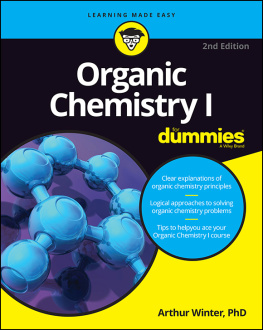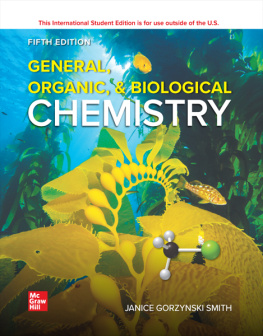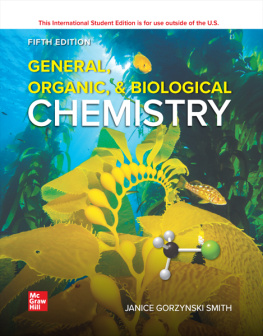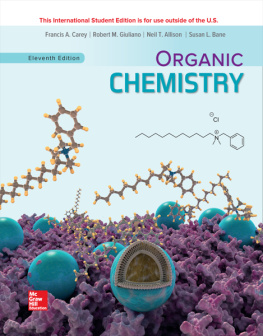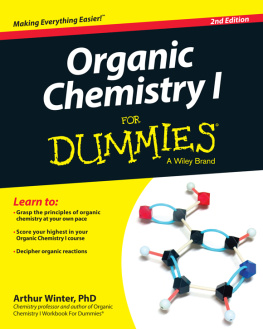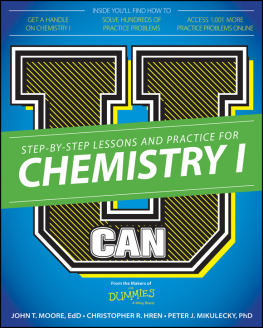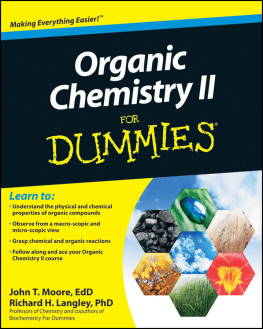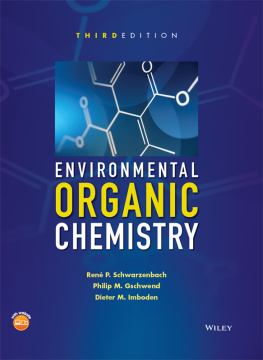
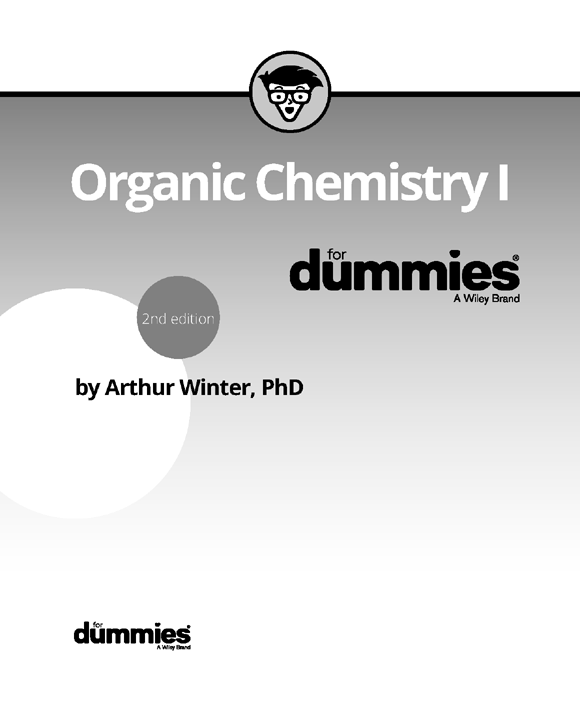
Organic Chemistry I For Dummies, 2nd Edition
Published by: John Wiley & Sons, Inc., 111 River Street, Hoboken, NJ 07030-5774, www.wiley.com
Copyright 2014 by John Wiley & Sons, Inc., Hoboken, New Jersey
Published simultaneously in Canada
No part of this publication may be reproduced, stored in a retrieval system or transmitted in any form or by any means, electronic, mechanical, photocopying, recording, scanning or otherwise, except as permitted under Sections 107 or 108 of the 1976 United States Copyright Act, without the prior written permission of the Publisher. Requests to the Publisher for permission should be addressed to the Permissions Department, John Wiley & Sons, Inc., 111 River Street, Hoboken, NJ 07030, (201) 748-6011, fax (201) 748-6008, or online at http://www.wiley.com/go/permissions.
Trademarks: Wiley, For Dummies, the Dummies Man logo, Dummies.com, Making Everything Easier, and related trade dress are trademarks or registered trademarks of John Wiley & Sons, Inc., and may not be used without written permission. All other trademarks are the property of their respective owners. John Wiley & Sons, Inc., is not associated with any product or vendor mentioned in this book.
LIMIT OF LIABILITY/DISCLAIMER OF WARRANTY : WHILE THE PUBLISHER AND AUTHOR HAVE USED THEIR BEST EFFORTS IN PREPARING THIS BOOK, THEY MAKE NO REPRESENTATIONS OR WARRANTIES WITH RESPECT TO THE ACCURACY OR COMPLETENESS OF THE CONTENTS OF THIS BOOK AND SPECIFICALLY DISCLAIM ANY IMPLIED WARRANTIES OF MERCHANTABILITY OR FITNESS FOR A PARTICULAR PURPOSE. NO WARRANTY MAY BE CREATED OR EXTENDED BY SALES REPRESENTATIVES OR WRITTEN SALES MATERIALS. THE ADVISE AND STRATEGIES CONTAINED HEREIN MAY NOT BE SUITABLE FOR YOUR SITUATION. YOU SHOULD CONSULT WITH A PROFESSIONAL WHERE APPROPRIATE. NEITHER THE PUBLISHER NOR THE AUTHOR SHALL BE LIABLE FOR DAMAGES ARISING HEREFROM.
For general information on our other products and services, please contact our Customer Care Department within the U.S. at 877-762-2974, outside the U.S. at 317-572-3993, or fax 317-572-4002. For technical support, please visit www.wiley.com/techsupport .
Wiley publishes in a variety of print and electronic formats and by print-on-demand. Some material included with standard print versions of this book may not be included in e-books or in print-on-demand. If this book refers to media such as a CD or DVD that is not included in the version you purchased, you may download this material at http://booksupport.wiley.com . For more information about Wiley products, visit www.wiley.com .
Library of Congress Control Number: 2013954080
ISBN 978-1-119-29337-8 (pbk); ISBN 978-1-119-29656-0 (ebk); ISBN 978-1-119-29657-7 (ebk)
Organic Chemistry I For Dummies, 2nd Edition (9781119293378) was previously published as Organic Chemistry I For Dummies, 2nd Edition (9781118828076). While this version features a new Dummies cover and design, the content is the same as the prior release and should not be considered a new or updated product.
Organic Chemistry I For Dummies
To view this book's Cheat Sheet, simply go to www.dummies.com and search for Organic Chemistry I For Dummies Cheat Sheet in the Search box.
- Table of Contents
Guide
Pages
Introduction
Regrettably, when many people think of chemicals, the first things that usually pop into their minds are substances of a disagreeable nature harmful pesticides and chemical pollutants, nerve agents and chemical weapons, or carcinogens and toxins.
But most chemicals play roles of a more positive nature. For example, both water and sugar are chemicals. Why are these chemicals important? Well, for one thing, both are components of beer. The enzymes in yeasts are also important chemicals used in fermentation, a process that involves the breakdown of sugars into beer. Ethyl alcohol is the all-important chemical responsible for beers effect on the body. In my view, these three representative examples of chemicals thoroughly rebut the notion that all chemicals are bad.
In fact, those who have a bad opinion of all chemicals must suffer from the psychological condition of self-loathing, because human bodies are essentially large vats of chemicals. Your skin is made up of chemicals along with your heart, lungs, kidneys, and all your other favorite organs and appendages. And most of the chemicals in your body in addition to the chemicals in all other living things are not just any kinds of chemicals, but organic chemicals. So, anyone who has any interest at all in the machinery of living things (or in the chemistry of beer and wine) will have to deal at some point and at some level with organic chemistry.
Of course, the natures of these dealings have historically not always been so pleasant. Pre-med students and bio majors (and even chemistry majors) have butted heads with organic chemistry for decades, and, regrettably, the winner of this duel has not always been the human.
Part of the problem, I think, comes from students preconceptions of organic chemistry. I admit that, like many students, I had the worst preconceptions going into organic chemistry. When I thought of organic class, I thought of wearying trivia about the chemical elements, coma-inducing lectures delivered in a monotone, complex mathematical equations sprawling across mile-long chalkboards, and a cannon fire of structures and chemical reactions vomited one after the other in succession. The only successful students, I thought, would be those wearing thick spectacles, periodic-table ties, and imitation leather shoes with Velcro straps.
But if my preconceptions of organic lecture were bad, my preconceptions of organic labs were worse. I feared the organic laboratory course, certain the instant I would step into the lab, all the chemicals would instantly vaporize, condense on my unclothed extremities, and permeate my hair, pores, follicles, and nails. As a result, my skin would erupt in a rash. I would bald. My nails would yellow. The love of my life would take one look at my scarred physiognomy, sicken of men, and leave me sitting alone, Job-like, amongst the ashes of my existence, scratching my weeping sores with a broken potsherd.
Turns out I was wrong on that one. I was surprised to find that I actually liked organic chemistry. I really liked doing it it was fun! And working in the laboratory making new substances was less toxic than I thought it would be and was instead interesting and even entertaining. I was wrong about the math, too: If you can count to 11 without taking off your shoes, you can do the math in organic chemistry. The turning point, really, was when I stopped fighting organic chemistry, stopped feeding my preconceptions, and changed my attitude. That was when I really started enjoying the subject.
I hope you choose not to fight organic chemistry from the beginning (as I did) and instead decide to just get along and become friends with organic chemistry. In that case, this book will help you get to know organic chemistry as quickly as possible (and as well as possible), so that when your professor decides to test you on how well you know your newfound comrade, youll do just fine.
About This Book
With Organic Chemistry I For Dummies, Ive written the book that I wouldve wanted when I was taking the first semester of organic chemistry. That means that this book is very practical. It doesnt try to mimic a textbook, or try to replace it. Instead, its designed as a complement to a text, highlighting the most important concepts in your textbook. Whereas a textbook gives you mostly a just-the-facts-maam style of coverage of the material and provides you with lots of problems at the ends of chapters to see if you can apply those facts this book acts as an interpreter, translator, and guide to the fundamental concepts in the subject. This book also gets to the nuts and bolts of how to actually go about tackling certain problems in organic chemistry.
Next page
